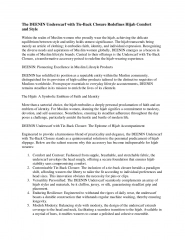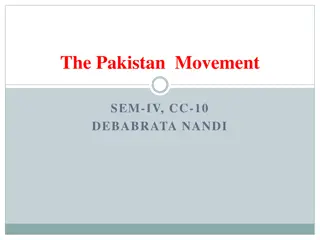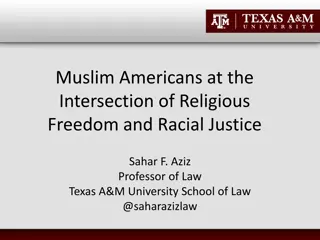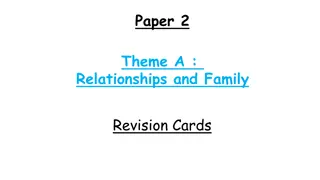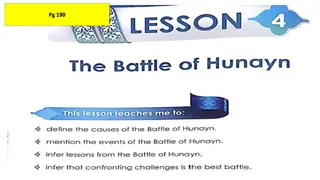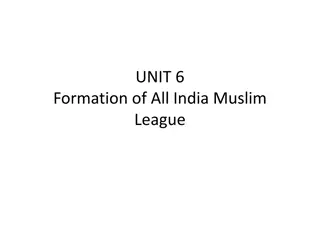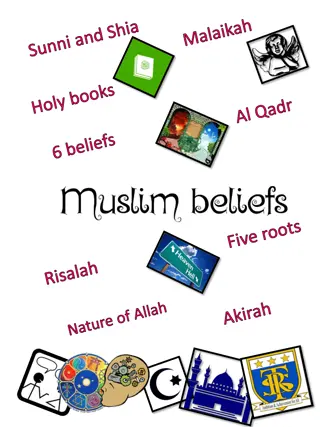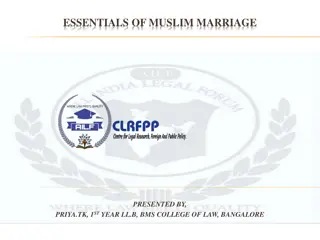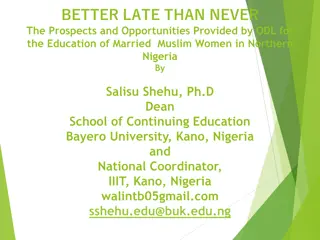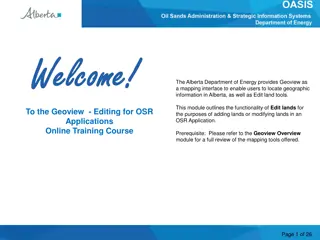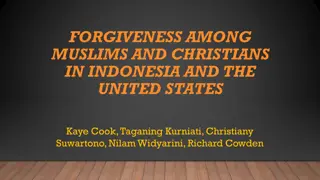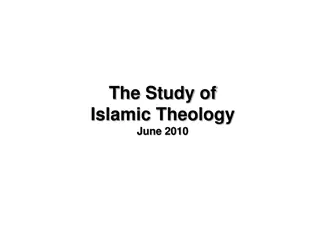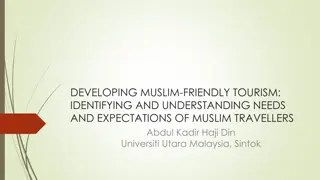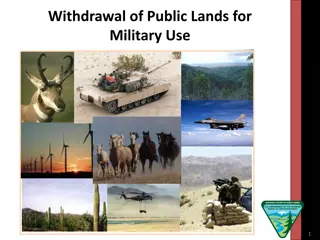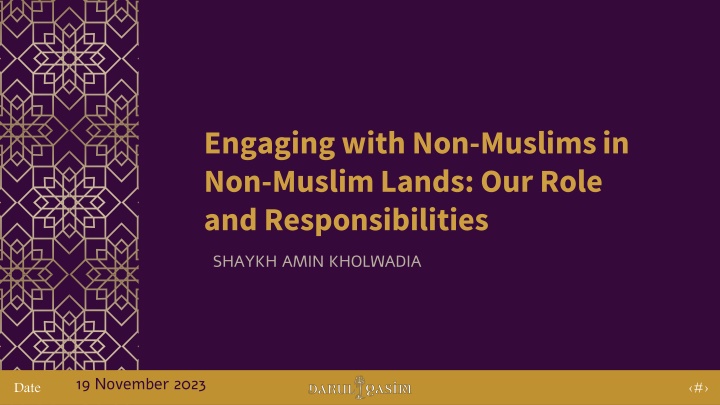
Engaging with Non-Muslims in Non-Muslim Lands: Understanding Roles and Responsibilities
Explore the dimensions of engagement with non-Muslims in non-Muslim lands, delving into religious pluralism, practical rituals, cultural customs, and more. Gain insights into the seven dimensions of engagement and the importance of understanding diverse worldviews for effective interaction. Discover the significance of engaging with others respectfully while upholding one's beliefs and principles.
Download Presentation

Please find below an Image/Link to download the presentation.
The content on the website is provided AS IS for your information and personal use only. It may not be sold, licensed, or shared on other websites without obtaining consent from the author. If you encounter any issues during the download, it is possible that the publisher has removed the file from their server.
You are allowed to download the files provided on this website for personal or commercial use, subject to the condition that they are used lawfully. All files are the property of their respective owners.
The content on the website is provided AS IS for your information and personal use only. It may not be sold, licensed, or shared on other websites without obtaining consent from the author.
E N D
Presentation Transcript
Engagingwith Non-Muslimsin Non-Muslim Lands: Our Role and Responsibilities SHAYKH AMIN KHOLWADIA 19 November 2023 Date #
Subjects Religious pluralism as part of Abode of Trial (Dar al- Mihna) Seven Dimensions of Engagement Date #
Religious pluralism as part of Abode of Trial Pluralism exists because of divine will And if your Lord had willed, He could have made mankind one community; but they will not cease to differ. Q.11:118 And it is He who created the heavens and the earth in six days - and His Throne had been upon water - that He might test you as to which of you is best in deeds. But if you say, "Indeed, you are resurrected after death," those who disbelieve will surely say, "This is not but obvious magic. Q11:7 Date #
Seven dimensions of engagement Scholar of religion Ninian Smart (d. 2001) provided useful breakdown of worldviews into seven dimensions: 1. 2. 3. 4. 5. 6. 7. Practical and Ritual dimension Experiential and Emotional dimension Narrative and Mythic dimension Doctrinal and Philosophical dimension Ethical and Legal dimension Social and Institutional dimension Material dimension Date #
1. 2. 3. 4. 5. 6. 7. Practical Experiential Narrative Doctrinal Ethico-Legal Social Madrassa, mosque, courtroom, caliphate Material Architecture, clothing, mushaf, food, art, calligraphy Ibadat, Urf, Addat Tasawwuf, Tazkiyyat, spiritual psychology Creation, Qisas al-Anbiya, civilizational history Aqida, Ilm al-Kalam, Falsafa Fiqh, Adab, Qanun, economy Date #
Practical dimension of engagement Ibadat No engagement in obligatory rituals and festivities such as in Salat, Hajj, Siyam, Eucharist, Christmas, Easter etc. which represent the specific doctrines of the religion. Minimal engagement in Dua such as Rain prayer and other dua of calamity and blessings which are deemed as applying general monotheistic norms. No engagement in Dua which violate general monotheistic norms and include specific Kufr notions. Date #
Practical dimension of engagement Urf and Addat Minimal engagement in customs such as weddings and funerals. Minimal engagement in civic rituals such as national prayer and holidays. Date #
Experiential dimension of engagement Tasawwuf and Tazkiyyat Spirituality is a universal human need Psychology of religion shows similar neurological effects in prayer among all humans Wisdom and character development (tazkiyya) is found in many traditions across the ages But each religion and worldview has their own philosophy of mind and soul and therefore mix truth with falsehood. Minimal engagement in character development (tazkiyya) No engagement in spiritual psychology (tasawwuf) Date #
Narrative dimension of engagement Creation, Qisas al-Anbiya, civilizational history Almost all religions and worldviews have creation and religious stories which represent their monotheistic, polytheistic or materialist beliefs which mix empirical and religious facts with fiction and are only useful for scholars of religion. Minimal to no engagement with narratives of other religions as these are only useful for scholars of religion. Civilizational history as referring to relating factual events are important to understand Abode of Trial. Date #
Doctrinal dimension of engagement Aqida and Ilm al-Kalam Aqida represent the specific beliefs of a religion. Ilm al-Kalam is the rational science defending and explaining the beliefs of Islam (philosophy of religion), and engages the beliefs of other religions (comparative theology). No engagement with the Aqida of others, but instead full engagement with Islamic Aqida. Minimal engagement in Ilm al-Kalam to know how to defend Islam and how it differs from other religions. Date #
Doctrinal dimension of engagement Falsafa Al-Ghazali stated that one should know general philosophy (logic, mathematics, rhetorics) as this develops critical knowledge skills. He also stated to general believers stay away from complex philosophy such as metaphysics as it can create doubt and confusion. Date #
Ethico-legal dimension of engagement Fiqh and Adab Most religions have next to their ritual practice specific norms and commands in relation to food, dress, marriage, family, crime, war, trade etc. Islam accepts some of their norms as acceptable for Muslims to engage with such as food and marriage, but no engagement with the Fiqh of other religions which represent their specific religious identity. Adab or Akhlaq should be applied to every human, except those that represent the rights of Muslims. Date #
Ethico-legal dimension of engagement Qanun and economy Qanun or secular law is promulgated by the local authorities to retain order and apply justice in society. Economy is the system of trade and commerce which allows people to gain sustenance and personal and communal wealth. Muslims are obligated to follow the Qanun of the land they live in, except when it orders them to violate core Islamic beliefs and norms. All commerce is allowed while avoiding usury and haram goods, and not engage in unlawful contracts (insurance) Date #
Social dimension of engagement Madrassa and mosque Gaining general and religious knowledge skills are on obligation on each believer, engaging public schools are therefore allowed to gain general knowledge next to obligatory religious schooling in madrassa and mosque. Religious schools (Islamic primary/secondary schools) which provide both general and religious knowledge are recommended. Engaging with other religious institutions such as churches should only be done by and under the supervision of scholars and believers committed to the mosque. Date #
Social dimension of engagement Courtrooms and political systems Engaging in local social service, judicial and political systems are allowed to spread justice and wellbeing. It is especially recommended when specific engagement can strengthen and protect the Muslim community. Muslim scholars advised to not or minimally engage higher politics and political rulers for the fear of being corrupted by power. Date #
Material dimension of engagement Architecture, clothing, food, and art Most forms of architecture, clothing and food are generally acceptable (mubah). No engagement with material expressions that incorporate or represent haram beliefs, symbols, and products. Muslims should hold on and promote as much as possible their specific material expressions to showcase themselves as a distinct community with a distinct religion. Date #

